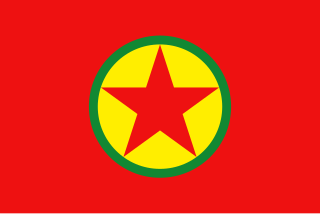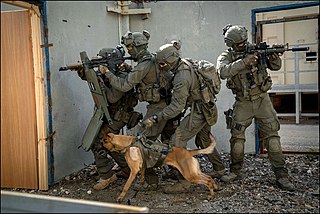
Hezbollah is a Lebanese Shia Islamist political party and militant group, led by its Secretary-General Hassan Nasrallah since 1992. Hezbollah's paramilitary wing is the Jihad Council, and its political wing is the Loyalty to the Resistance Bloc party in the Lebanese Parliament.

The Kurdistan Workers' Party or PKK is a Kurdish militant political organization and armed guerrilla movement, which historically operated throughout Kurdistan, but is now primarily based in the mountainous Kurdish-majority regions of southeastern Turkey and northern Iraq. Since 1984, the PKK has utilized asymmetric warfare in the Kurdish–Turkish conflict. Although the PKK once sought an independent Kurdish state, in the 1990s its aims shifted toward autonomy and increased rights for Kurds within Turkey.

Counterterrorism, also known as anti-terrorism, incorporates the practices, military tactics, techniques, and strategies that governments, law enforcement, business, and intelligence agencies use to combat or eliminate terrorism. Counter-terrorism strategy is a government's motivation to use the instruments of national power to neutralize and conquer terrorists, these organizations they have, and these networks they contain in order to render them incapable of using evil to instill fear and to coerce the government or citizens to react in accordance with these terrorists' goals.

"State Sponsors of Terrorism" is a designation applied by the United States Department of State to countries which the Department alleges to have "repeatedly provided support for acts of international terrorism". Inclusion on the list imposes strict unilateral sanctions. The State Department is required to maintain the list under section 1754(c) of the National Defense Authorization Act for Fiscal Year 2019, section 40 of the Arms Export Control Act, and section 620A of the Foreign Assistance Act. As of 2021, the list consists of Cuba, Iran, North Korea, and Syria. Countries formerly on the list were Iraq, Libya, South Yemen, and Sudan.
State-sponsored terrorism is terrorist violence carried out with the active support of national governments provided to violent non-state actors. States can sponsor terrorist groups in several ways, including but not limited to funding terrorist organizations, providing training, supplying weapons, providing other logistical and intelligence assistance, and hosting groups within their borders. Because of the pejorative nature of the word, the identification of particular examples are often subject to political dispute and different definitions of terrorism.

Islamic terrorism refers to terrorist acts with religious motivations carried out by fundamentalist militant Islamists and Islamic extremists.

The Islamic Revolutionary Guard Corps is a branch of the Iranian Armed Forces, founded after the Iranian Revolution on 22 April 1979 by order of Ayatollah Ruhollah Khomeini. Whereas the Iranian Army defends Iranian borders and maintains internal order, according to the Iranian constitution, the Revolutionary Guard is intended to protect the country's Islamic republic political system, which supporters believe includes preventing foreign interference and coups by the military or "deviant movements". The IRGC is designated as a terrorist organization by the governments of Bahrain, Saudi Arabia and the United States.

Paul R. Pillar is an academic and 28-year veteran of the Central Intelligence Agency (CIA), serving from 1977 to 2005. He is now a non-resident senior fellow at Georgetown University's Center for Security Studies, as well as a nonresident senior fellow in the Brookings Institution's Center for 21st Century Security and Intelligence. He was a visiting professor at Georgetown University from 2005 to 2012. He is a contributor to The National Interest.
Hezbollah has a Foreign Relations Unit and maintains relations with a number of foreign countries and entities. These are particularly Shia states, but also Sunni groups like those affiliated with the Palestinian cause; and the group is also suggested to have operations outside the Middle East in places such as Latin America and North Korea.

The Islamic State (IS), also known as the Islamic State of Iraq and the Levant, Islamic State of Iraq and Syria, and by its Arabic acronym Daesh, is a militant Islamist group and former unrecognized quasi-state that follows the Salafi jihadist branch of Sunni Islam. It was founded by Abu Musab al-Zarqawi in 1999 and gained global prominence in 2014, when it drove Iraqi security forces out of key cities during the Anbar campaign, which was followed by its capture of Mosul and the Sinjar massacre.
Sherifa D. Zuhur is an academic and national security scholar of the Middle East and Islamic world. She was most recently a visiting scholar at the Center for Middle East Studies, University of California, Berkeley and is the director of the Institute of Middle Eastern, Islamic and Strategic Studies.

The Institute for the Study of War (ISW) is a United States–based think tank founded in 2007 by Kimberly Kagan, providing research and analysis regarding issues of defense and foreign affairs. It has produced reports on the Syrian War, the War in Afghanistan, and the Iraq War, "focusing on military operations, enemy threats, and political trends in diverse conflict zones". It currently publishes daily reports on the 2022 Russian invasion of Ukraine.
Daniel L. Byman is a professor at Georgetown University's Walsh School of Foreign Service. He is a senior fellow at the Center for Middle East Policy at the Brookings Institution where he conducts research on terrorism, Iran, and other Middle East security issues. Byman previously served as the vice dean of the School of Foreign Service's undergraduate program, the director of the Center for Security Studies and Security Studies Program at Georgetown University and as research director of the Center for Middle East Public Policy at the RAND Corporation. He is also the lead course instructor for Georgetown's massive open online course on Terrorism and Counter Terrorism.

The Foundation for Defense of Democracies (FDD) is a 501(c)(3) non-profit think tank and registered lobbying organization based in Washington, D.C., United States.

The territory of the Islamic State had its core in Iraq and Syria from 2013 to 2017 and 2019 respectively, where the proto-state controlled significant swathes of urban, rural, and desert territory. Today the group controls scattered pockets of land in the area, as well as territory or insurgent cells in other areas, notably Afghanistan, West Africa, the Sahara, Somalia, Mozambique, and the Democratic Republic of the Congo.

The Jordanian military intervention in the Syrian Civil War began on 22 September 2014, with airstrikes on Islamic State of Iraq and the Levant (ISIL) targets, and escalated after the murder on Muath al-Kasasbeh, a captured Jordanian pilot, by ISIL, in early 2015. Though Jordan's strikes in Syria largely tapered off after December 2015, airstrikes have continued through February 2017, and Jordan has continued to support rebel groups in Syria and host military activities of other countries.

Liwa Fatemiyoun, literally "Fatimid Banner", also known as Fatemiyoun Division or Fatemiyoun Brigade, is an Afghan Shia militia formed in 2014 to fight in Syria on the side of the Syrian government.The group's officially designated purpose, is the defense of the shrine of Zaynab bint Ali, and to fight "takfiri terrorists" in Syria, which would come to include the Islamic State (IS). It is funded, trained, and equipped by the Islamic Revolutionary Guard Corps (IRGC), and fights under the command of Iranian officers. Both the Fatemiyoun Brigade and the Iranian government downplay their relationship with one another, despite clear coordination and the brigade's operation under the auspices of the IRGC. Liwa Fatemiyoun is also closely associated with Hezbollah Afghanistan.
Qatar has been accused of allowing terror financiers to operate within its borders, which has been one of the justifications for the Qatar diplomatic crisis that started in 2017 and ended in 2021. In 2014, David S. Cohen, then United States Under Secretary of the Treasury for Terrorism and Financial Intelligence, accused Qatari authorities of allowing financiers who were on international blacklists to live freely in the country: "There are U.S.- and UN-designated terrorist financiers in Qatar that have not been acted against under Qatari law." Accusations come from a wide variety of sources including intelligence reports, government officials, and journalists.

The Islamic Military Counter Terrorism Coalition is an intergovernmental counter-terrorist alliance of countries in the Muslim world, united around military intervention against ISIL and other counter-terrorist activities. Its creation was first announced by Saudi Arabian defence minister Mohammad bin Salman Al Saud, on 15 December 2015. The alliance was to have a joint operations center in Riyadh, Saudi Arabia.
Ferhat Abdi Şahin, better known by his nom de guerreMazloum Abdi and his previous nom de guerreŞahin Cilo, is a Syrian Kurdish military leader, serving as the commander-in-chief of the Syrian Democratic Forces (SDF).














